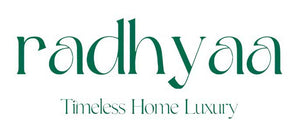Brass Spoon: More than Just Aesthetics | Radhyaa
Any brass spoon is preferred and used in kitchens and dining rooms because of their gold-like gleaming appearance and the solid feel of the objects. However, brass spoons are not just beautiful – they are healthy to use and friendly to the environment, making them worthy investments for any home. Radhyaa is here today to delve deeper and find out why these spoons are so special and have been used for so long.

Antimicrobial Characteristics of Brass
The other beneficial property of brass utensils and other brass products like brass spoon is that brass is antimicrobial in its nature. This means brass has a natural ability of neutralising bacteria and viruses that come into contact with the surface of the metal. Studies have shown brass to be effective at neutralising:
- E. coli
- Salmonella
- Staphylococcus aureus
- Pseudomonas aeruginosa
- Enterobacter aerogenes
- Methicillin resistant Staphylococcus aureus (MRSA)
The metallic brass has some ability to fight off bacteria because it comprises copper - which helps it to have antimicrobial properties. Copper ions attach to bacteria and viruses and disrupt the structure of their cells and membranes. This eventually results in eradication of the microorganism in question.
Due to its antimicrobial properties, brass is used extensively in the production of kitchen and dining utensils. Brass spoons, especially, help to reduce the rate at which germs spread and hence reduce the cases of food poisoning when cooking, serving food and eating.
The Environmental Impact
Apart from health concerns, a brass spoon is more environmentally friendly than many spoons made of other materials.
- Long-lasting: Brass is a very strong material and therefore a well-made brass spoon can remain in use for several generations with little signs of rusting. This helps in avoiding situations where one has to replace burnt out plastic utensils or spoons from aluminium that have a shorter lifespan than the utensils.
- Recycle: Another advantage of brass is that it is 100 percent recyclable. It is recyclable and at the end of its useful life, an old brass spoon can be recycled and turned into new products. Recycled brass provides the same characteristics of new brass material but without the loss of quality or strength. This means that brass has very good ‘cradle to cradle’ sustainability.
- Low/No Toxin Content: Brass also has a negligible content of toxins and has a lower emission of CO2 during its production than materials such as stainless steel or sterling silver. Selecting brass over other metals is also an environmentally friendly decision because of a lesser emission of carbon.
Brass Care and Maintenance
The brass material provides damage benefits and it is important to note that it is delicate in some ways and therefore needs certain handling in order to stand those many years of usage. Here are some brass spoon care tips:
- Polishing: A brass spoon can fade or tarnish, and its surface might become smoother through extensive usage over time. It is recommended that the brass should be gently rubbed with soft brass polish paste or brass cleaning solutions periodically in order to have the golden touch back. Do not use harsh scraping or rough surfaces or chemicals which may harm the surface of the material.
- Washing: Never immerse brass in the dishwater as it is very abrasive, and scrubber it by hand. Wash with warm water and a mild soap and avoid using a hard brush, scrub or scraper. Rinse and clean and dry until there are no water stains remaining.
- Storage: It is always important to handle brass spoons carefully to avoid scratching or denting them in some way. Store items in drawers or utensil trays with soft lining. It is advisable that brass spoons should never be stacked or forced alongside other metal serving spoons.
- Avoidance of Acidic Foods: Brass, in most cases, is food safe, but when comes into contact with acidic foods for a long time, the copper layer can erode into the food causing nausea if consumed in the long run. Avoid using brass containers with foods that contain vinegar, tomatoes, lemons and other acidic ingredients and so on.
Radhyaa’s Fine Brass Spoon Collection
Radhyaa brings exquisitely designed brass teaspoons and other brass utensils that are based on the tradition and the rich Indian heritage of the 19th century. From the sleek Etched Raj spoons to the delicately cut Mango spoons, a Radhyaa brass spoon lends a classic luxury to your kitchen or dining table.

Conclusion
While antimicrobial brass eliminates germs, environmental friendliness and unique Indian brassware design, a brass spoon from Radhyaa offers much more than mere beauty. It is a long term investment in health and aesthetics, the environment and style that can be handed down from generation to generation when well maintained. Visit Radhyaa today to buy yours!

